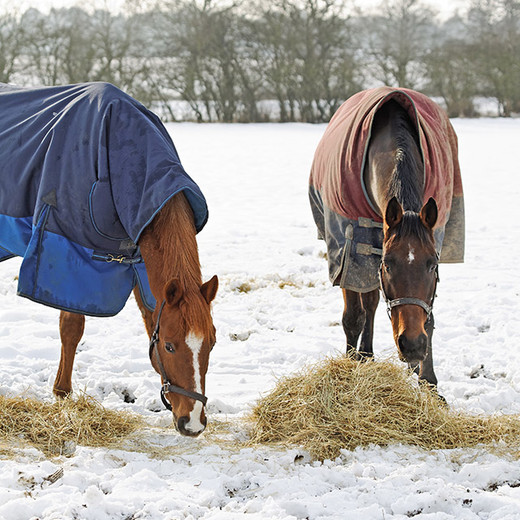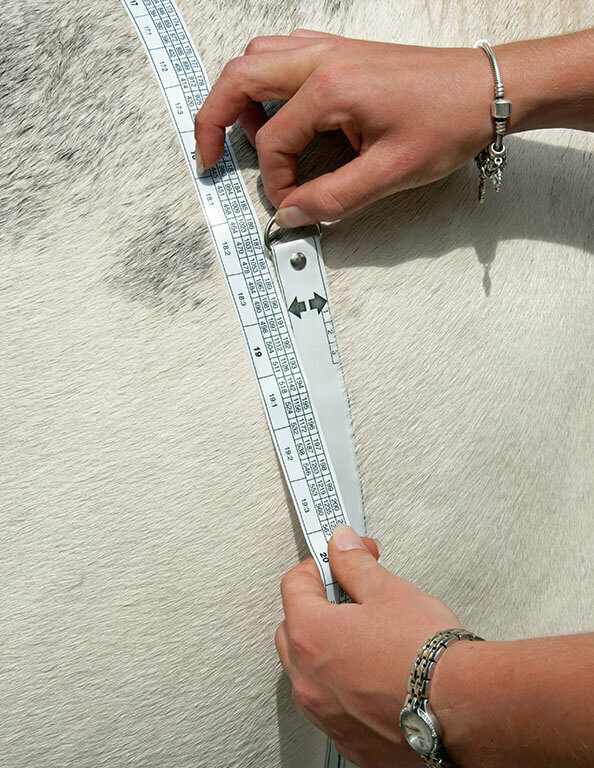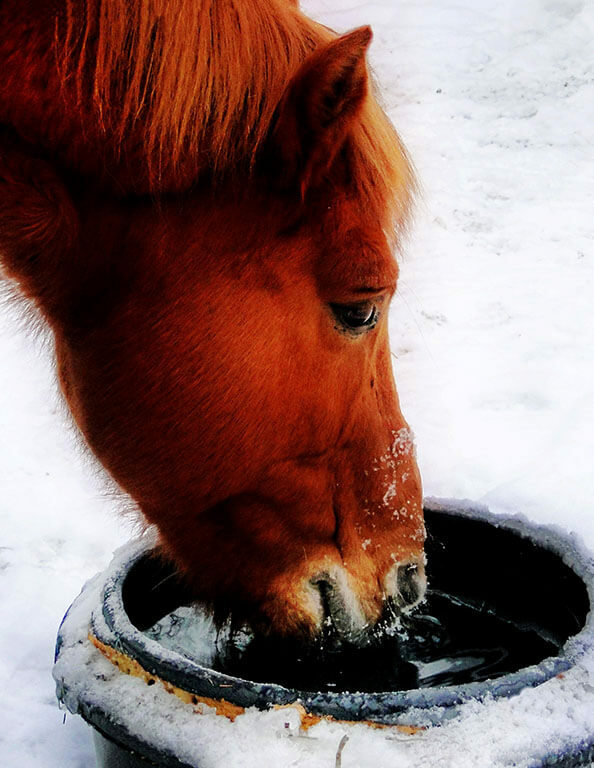Feeding your horse over winter
Jan 21st 2021

Learn how to feed your horse over winter so it gets all the nutrition it needs for the colder months. Pick up some tips for good & poor doers as well!
Spending time outside on a beautifully crisp winter’s day with our horses is a wonderful thing. However, the colder months do bring various challenges and dangers that aren’t present throughout the rest of the year.
Obviously, we have to make sure our steeds are nice and warm, ensuring they have the right stable rug or turnout, and we need to be careful they don’t come a cropper on icy ground. Another incredibly important consideration is how and what to feed your horse in winter. The cold, wet conditions in winter can increase your horse’s energy output by up to 30%. It’s estimated that for every degree below about 7.5 degrees celsius, your horse requires an additional 15% energy in their diet.

How to feed a good doer in winter
A good doer is a horse who’s quite happy to eat and maintains good condition without much of a fuss, which is what we all want! It also makes life a little easier in winter.
Horses need an almost constant supply of food so that the saliva they produce combats the production of stomach acid. Always try to make sure they have a good supply of hay.
However, if you’re concerned that they might actually put weight on over winter, then you can use late cut hay, which should contain fewer calories. You can also soak hay in water for around 12 hours, which will reduce the calorie intake. Although this can reduce the nutrient content, so you might need to supplement that with a feed balancer.
If you horse is a little overweight or they don’t drop weight too rapidly, winter is a good time to get them into good shape and let nature help them shed a few pounds - just ensure they have enough vitamins and minerals to stay healthy.
How to feed a poor doer in winter
A poor doer is a horse that loses weight easily, so this can be a little problematic during winter.
While you may need to increase a poor doer’s food intake, it’s important to do it in the right way. For example, you may be tempted to give your horse bigger meals, but as they only have relatively small stomach, it’s much more effective to give them several smaller meals - otherwise the food will go through them too fast and they won’t absorb the nutrients and energy they need.
It’s also worth checking the feed you’re giving your horse - is there another type that offers a higher level of energy? If so, it might be worth switching to this over winter, but do this gradually to ensure they get used to it.
You can also look at adding sugar beet to your horses feed this is an excellent source of highly digestible fibre and a valuable source of calories. Sugar beet is significantly more digestible than hay and contains a similar level of energy to cereal grains and conditioning feeds which is why it is often referred to as a 'super fibre'.
Using oil in their meals can also help promote weight gain as it is very calorie-dense and provides a slow release of energy. You can purchase some great equine specific oils or alternatively supermarket oils can work fine for this, although it’s best to opt for un-blended oils such as sunflower oil or corn oil.
Another good tip for poor doers is to ensure they have the right rug and wear it regularly to limit the energy they’re producing to stay warm. If they’re turned out constantly, try and provide some shelter for them.

General winter horse feeding tips
- Regularly check the condition of the ground - is it frozen, covered in snow or going bare? If so, you’ll need to supplement their grazing with hay.
- Horses can usually maintain weight on 1.5-2% of their bodyweight in feed per day - that’s a 7.5-10kg for a 500kg horse.
- Digestion and breakdown of forages actually provides an internal source of heat, especially when digesting fibre.
- Remember, grass doesn't have the same nutritional value during the winter. Consider introducing a supplement.
- Beware of turning out on frosty mornings more importantly if your horse suffers from laminitis. The grass stores the sugar in these cold temperatures instead of using it to grow.
- Older horses or those with poor quality teeth may have extra trouble eating. Put some high-fibre cubes in some mash to ensure they get what they need. Make mash by mixing hot water with pelleted or concentrate feed and allow it to expand for 15 minutes.
- Stock up with plenty of hay and do so early. You don’t want to run out, and prices tend to go up during the winter months.
- Fresh, clean water is just as important in winter as in the summer. Check it hasn’t frozen over, and if it’s too cold then your horse won’t want to drink it.
- Make sure your horse is wormed to avoid issues with digestion.
- Provide your horse with a salt block so they maintain their sodium levels.
If you’re unsure about what to feed your horse over winter, please consult an equine nutritionist or your vet.




